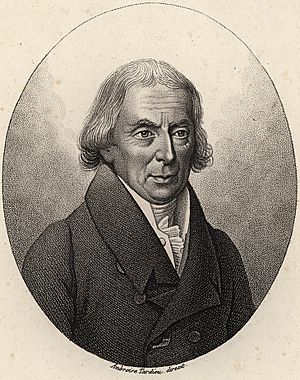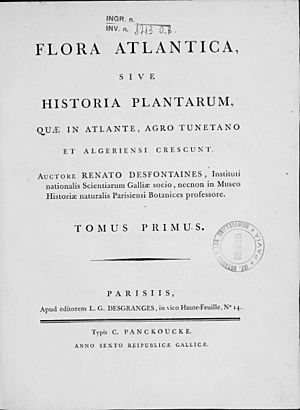René Louiche Desfontaines facts for kids
Quick facts for kids
René Louiche Desfontaines
|
|
|---|---|
 |
|
| Born | 14 February 1750 Tremblay, Ille-et-Vilaine, France
|
| Died | 16 November 1833 (aged 83) |
| Known for | Flora Atlantica |
| Awards | French Academy of Sciences, Académie Nationale de Médecine, Légion d’honneur |
| Scientific career | |
| Institutions | Jardin des Plantes, Muséum National d'Histoire Naturelle |
| Influences | Louis Guillaume Lemonnier |
| Author abbrev. (botany) | Desf. |
René Louiche Desfontaines (born February 14, 1750 – died November 16, 1833) was a famous French botanist. He spent his life studying plants and exploring new species. Desfontaines is especially known for his important book, Flora Atlantica. This book described many plants from North Africa.
Contents
Who Was René Desfontaines?
René Louiche Desfontaines was a scientist who loved plants. He became a leading expert in botany, which is the study of plants. His work helped us understand many new plant types.
Early Life and Education
René Desfontaines was born in a place called Tremblay in France. He first studied at the Collège de Rennes. In 1773, he moved to Paris to study medicine.
His interest in botany began when he attended lectures. These talks were given by Louis Guillaume Lemonnier at the Jardin des Plantes. Desfontaines quickly became very good at studying plants.
Exploring New Plants
In 1783, Desfontaines was chosen to join the French Academy of Sciences. This was a big honor for a young scientist. He also became a member of the Académie Nationale de Médecine.
Desfontaines spent two years exploring Tunisia and Algeria in North Africa. He collected a huge number of plants there. When he returned, he had a large collection of new plant species.
Flora Atlantica Book
Desfontaines used his plant collection to write a major book. It was called Flora Atlantica. This book was published between 1798 and 1799. It had two volumes and described 300 types of plants that were new to science.
He also studied birds, which is called ornithology. He shared his findings from his trips to Africa. These were published in a scientific paper.
A Leader in Science
In 1786, Desfontaines became a professor of botany. He taught at the Jardin des Plantes, taking over from his teacher, Lemonnier. He later became the director of the Muséum National d'Histoire Naturelle.
Desfontaines also helped start the Institut de France. He was the president of the French Academy of Sciences. He was even given the Légion d’honneur, a very important award in France. During the French Revolution, he helped shape how natural history was taught and studied.
What is a Herbarium?
Desfontaines created a special collection of dried plants. This collection is called a herbarium. His herbarium was known as the Flora Atlantica collection. It has 1480 plant samples. Many of these are "type specimens." These are the original plants used to describe a new species. After he died, this important collection was given to the City of Paris.
Plants Named After Him
Two types of plants were named in honor of René Desfontaines. These are the genera Desfontainia and Fontanesia. This is a way to remember his important work.
When you see the abbreviation Desf. after a plant name, it means that René Desfontaines was the person who first described that plant.
List of His Works
- Flora Atlantica (1798–1799)
 | Bayard Rustin |
 | Jeannette Carter |
 | Jeremiah A. Brown |


